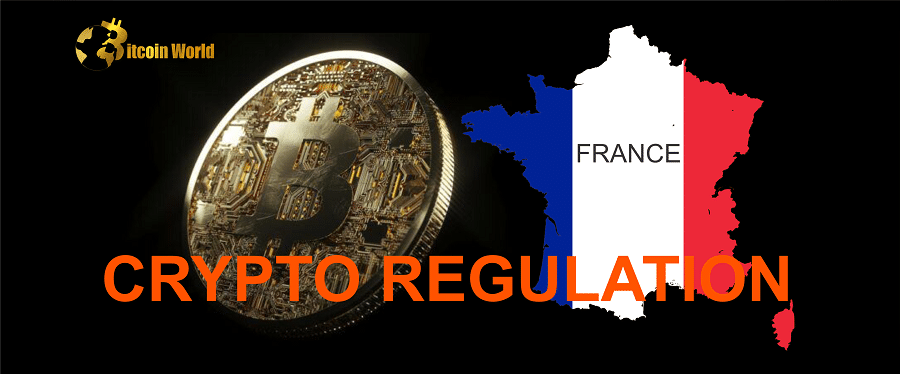The cryptocurrency world is still reeling from the dramatic downfall of FTX, and the ripples are spreading far and wide. Now, France is stepping into the regulatory spotlight. Fueled by the FTX debacle and with the European Union’s Markets in Crypto Assets (MiCA) initiative on the horizon, a French Senator is pushing for stricter crypto regulations. What does this mean for the future of crypto in France, and potentially, the global landscape?
Why is France Rethinking Crypto Regulations Now?
France has been relatively welcoming to the crypto industry, aiming to become a hub for digital innovation. However, the FTX collapse has served as a stark reminder of the risks associated with unregulated or lightly regulated crypto entities. As reported by the Financial Times, there’s growing pressure to close regulatory loopholes. France’s current framework, designed to attract crypto businesses, might be unintentionally creating vulnerabilities.
Senator Maurey’s Proposal: What’s on the Table?
Senator Hervé Maurey of the Finance Commission is at the forefront of this regulatory shift. His proposal aims to amend the existing provisions to ensure greater oversight. Here’s a breakdown of what he’s suggesting:
- End to Regulatory Light Touch: Currently, cryptocurrency companies in France can register as Digital Asset Service Providers (DASPs) and operate with less stringent regulatory oversight. This was intended to be a welcoming environment.
- Mandatory Licensing: Senator Maurey is proposing to change this by requiring registered crypto companies to obtain a full regulatory license to conduct domestic business.
- Transition Period: The proposed change includes a transition period, suggesting that companies currently registered would need to secure a full license by 2026 to continue operating in France.
- Effective Date: If approved, the new licensing requirement could come into effect as early as October 2023.
France’s Current Crypto Landscape: A Business-Friendly Hub?
France’s approach to crypto regulation has indeed made it an attractive destination for crypto businesses. Being ranked among the top twenty crypto economies globally and considered “business-friendly” is a testament to this. Let’s look at some key aspects of the current French crypto environment:
- DASP Registration: Digital Asset Service Providers (DASPs) in France are required to register and comply with Anti-Money Laundering and Counter-Terrorist Financing (AML/CFT) regulations.
- No Mandatory Licensing (Currently): Crucially, this registration process doesn’t automatically equate to obtaining a full operational license. Many companies operate under this registration.
- Significant Number of Registered Firms: Reports indicate that around 50 companies are currently registered as DASPs in France, operating without a full license.
- Attracting Major Players: France has successfully attracted significant players in the crypto space. For instance, SG Forge, a subsidiary of one of France’s oldest banks, secured approval to offer crypto services. Binance also obtained registration in France this year.
The FTX Domino Effect: A Catalyst for Change
The collapse of FTX wasn’t just an isolated incident; it triggered a chain reaction across the crypto ecosystem. The repercussions include:
- Business Failures: Numerous businesses with direct or indirect exposure to FTX have faced significant financial distress or even collapse.
- Investor Losses: Investors globally have suffered billions of dollars in losses due to FTX’s bankruptcy, eroding trust in the crypto market.
- Regulatory Scrutiny: The scale of the FTX fallout has prompted regulators worldwide to re-evaluate and potentially tighten their oversight of the crypto industry.
Senator Maurey aptly described the FTX collapse as a “detonation” that has led to a “moment of reckoning.” This event has undeniably accelerated the push for stricter crypto regulations in France and globally.
Global Trend: Stricter Crypto Rules on the Horizon?
France is not alone in its move towards enhanced crypto regulation. The FTX saga has acted as a wake-up call for regulators worldwide. Consider these recent developments:
- Hong Kong and Canada: Both Hong Kong and Canada have announced plans to strengthen their crypto regulations in the wake of FTX, aiming to prevent similar incidents in the future.
- United States: Senators in the US are actively pushing for Congress to enact new legislation to regulate cryptocurrency, indicating a bipartisan desire for more robust oversight.
What Does This Mean for the Crypto Industry in France and Beyond?
If Senator Maurey’s proposal gains traction and is implemented, it could significantly reshape the crypto landscape in France. Here’s a look at potential implications:
- Increased Compliance Burden: Crypto companies operating in France would face a higher compliance burden, requiring them to obtain a full license from the Autorité des Marchés Financiers (AMF), the French financial regulator.
- Potential Exit of Some Firms: The stricter regulations might deter some smaller or less established crypto firms from operating in France due to the increased costs and complexities of obtaining a license.
- Enhanced Investor Protection: On the flip side, stricter regulations are designed to enhance investor protection and create a more secure and trustworthy crypto environment.
- Setting a Global Precedent? France’s move could set a precedent for other jurisdictions, potentially leading to a broader trend of tighter crypto regulations globally, especially as MiCA implementation approaches in the EU.
Conclusion: Navigating the Evolving Regulatory Landscape
The crypto industry is at a crucial juncture. The FTX collapse has served as a catalyst for regulatory change, and France’s potential tightening of crypto rules is a significant development to watch. While stricter regulations may present challenges for crypto businesses in the short term, they are ultimately aimed at fostering a more sustainable and secure crypto ecosystem in the long run. As the regulatory landscape evolves, businesses and investors alike will need to adapt and navigate these changes to thrive in the future of digital finance. The coming months will be critical in shaping the future of crypto regulation, not just in France, but globally.
Disclaimer: The information provided is not trading advice, Bitcoinworld.co.in holds no liability for any investments made based on the information provided on this page. We strongly recommend independent research and/or consultation with a qualified professional before making any investment decisions.




